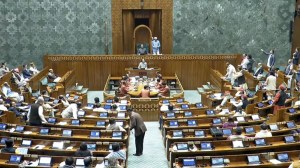Why Raj Thackeray may have directed MNS workers to halt Marathi language stir
Last week, the MNS chief Raj Thackeray told his supporters “not to hesitate and slap those refusing to speak Marathi” in Maharashtra. On Saturday, after days of reports of his partymen assaulting non-Marathi speakers, he requested them to stop their protests, insisting it was not a “compromise”.
 MNS chief Raj Thackeray’s request to his partymen came a day after bank unions wrote to Maharashtra CM Devendra Fadnavis, raising serious objections about the assaults. (Source: Express Archive)
MNS chief Raj Thackeray’s request to his partymen came a day after bank unions wrote to Maharashtra CM Devendra Fadnavis, raising serious objections about the assaults. (Source: Express Archive)Maharashtra Navnirman Sena (MNS) chief Raj Thackeray emphatically launched his “Mi Marathi (I am Marathi)” campaign on the day of Gudi Padwa (Marathi New Year) on March 30, urging his supporters “not to hesitate and slap those refusing to speak Marathi in the state”. However, the MNS chief’s renewed push around Marathi language and identity politics was short-lived after attracting massive backlash from various quarters.
Sources in the BJP said the Mahayuti government led by Devendra Fadnavis was under pressure to firmly rein in the regional outfit and that may have played a role in Thackeray quietening down. “The BJP does not want to antagonise its North Indian voter base, especially with the Assembly polls in Bihar around the corner. The party believes that even stray incidents of violence against north Indians in Mumbai will have a ripple effect and prove to be a disadvantage in the Bihar polls,” said a party insider.
Citing the active participation of non-Marathis in the 10-day Ganesh Chaturthi celebrations, a BJP leader who represents the north Indian community said it was natural to adapt to the culture, language, and system of the state that one settles in. “You do not need to assault someone to make an individual learn Marathi,” the leader said on the condition of anonymity.
After Thackeray’s Gudi Padwa rally, there were reports from across the state of MNS activists assaulting those who do not speak Marathi. On Saturday, the MNS chief urged them not to take the law into their own hands, even as he insisted it was not a compromise.
“We will step in whenever Marathi is taken for granted. We are not compromising … We do not want to take the law into our own hands, but I expect the government to follow the law regarding implementation of Marathi in all establishments across the state,” Thackeray said.
Thackeray’s request to his partymen also came a day after bank unions wrote to Fadnavis, raising serious objections about the assaults. “Bank officials are being threatened and assaulted. Such an atmosphere of intimidation does not augur well for the employees’ well-being and functioning of financial institutions,” the letter read.
Highly placed sources in the Chief Minister’s Office (CMO) confirmed that several sectors of the industry had raised concerns about the violence. “Even within the BJP, leaders representing non-Marathi constituents have raised the issue with the party’s state as well as the central leadership. Above all, the government was worried that the MNS’ campaign came at a time when Fadnavis had set an ambitious target of making Maharashtra a trillion-dollar economy by 2028. It feared that the incidents would prove to be a hurdle to the conducive political atmosphere in the state, a key aspect that global investors take into account before investing,” a source said.
Fadnavis has often credited the stable government and state ecosystem for drawing investments worth Rs 15.78 lakh crore — the highest by any state — at the World Economic Forum (WEF) in Davos in January.
A senior official in the finance ministry said regional parties pushing for language or jobs in Maharashtra was not a new phenomenon. “Investors and the industry seek reassurances on the ease of doing business. They are fine with the regional rhetoric being a part of the political discourse, but it becomes a serious problem when it leads to violence. There have been several instances in the past when industries have been forced to withdraw following protests. For instance, the Ratnagiri refinery project has been stalled for a decade while in West Bengal, the Tatas had to withdraw from Singur,” the official said.
It is not new for Maharashtra to see violence over the issue as the undivided Sena — from which Thackeray broke away in 2006 — in the past launched campaigns against migrants to push its “Marathi manoos (Marathi people)” plank. The agitations against north Indian migrants had been so violent that the then CMs of Bihar and Uttar Pradesh, while voicing concerns, wrote several times to their Maharashtra counterparts as well as the Centre.
CMO officials said it was the state’s responsibility to ensure the safety of its citizens. “Every party has the right to pursue its agenda but law and order cannot be compromised. Fadnavis may not seem to be a man of many words, but he knows when to act,” said a CMO insider.
- 01
- 02
- 03
- 04
- 05































